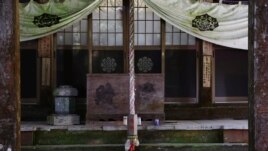29 September, 2024
Benmou Suzuki is a religious worker at a 420-year-old temple that is not in very good condition.
It is deep in the forest near a small Japanese mountain village. It does not look like a valuable property.
Yet two men recently asked Suzuki if he was interested in selling. He said he thinks they did not want the old, ornate building next to a mountain that is considered holy. Instead, they wanted the special tax status that comes with running a religious property.

Mikaboyama Fudoson temple is pictured in Fujioka, Gunma Prefecture, Japan September 4, 2024. (REUTERS/Kim Kyung-Hoon)
"There are people out there who want a temple, even a mountain temple like this," said 52-year-old Suzuki.
Japan's population is decreasing and interest in religion is less intense. There are fewer people to support the country's many temples and shrines.
Suzuki's Mikaboyama temple, for example, is in a small town, which also has three other Buddhist temples, one Shinto shrine and a Christian church.
Japanese officials say they are seeing more sales of religious properties to buyers who do not continue to run them as religious centers. Officials fear many are buying them to avoid paying taxes or possibly even to hide criminal activity.
Japan's Agency for Cultural Affairs oversees religious places. An official from the agency said, "It's already a sense of crisis for us and the religious community."
The public is unhappy about the sales, too. In Osaka, a temple sold in 2020 was later torn down for a property development. In Kyoto, news reports said a temple was destroyed to make a parking lot.
The owner of an active religious center in Japan is a corporation that pays no taxes. Even non-religious businesses on the property enjoy lower tax rates. The law permits many different activities like restaurants, hair salons and hotels.
The cultural affairs agency said it has increased its efforts to end the legal status of inactive religious corporations to stop sales to non-religious owners. Where there has been damage to a religious place, agency officials visit, warning the religious leaders about selling to such buyers.
It might seem easier for Japan to change its laws for purchasing religious properties. But the agency said the government does not like to change laws related to religion. They do not want to limit religious freedom, which Japan's constitution protects.
Osaka-based property dealer Takao Yamamoto said interest is rising quickly. He said a religious corporation license can sell for $210,000. Some religious properties, especially those where burials take place, are advertised for millions of dollars.
"Anyone can buy independent sites as long as you have money...even foreigners can buy them. Recently, a lot of Chinese people are trying to buy them," Yamamoto said.
For his part, Suzuki says he does not plan to sell Mikaboyama temple and is working on ideas to raise money to keep it up. "Temples are places for local people to gather and forge connections. We just can't get rid of them," he said.
I'm Jill Robbins.
Mariko Katsumura reported this story for Reuters. Jill Robbins adapted it for Learning English.
______________________________________________
Words in This Story
temple – n. a building for worship, in Japan, belonging to the Buddhist religion
ornate –n. including many fine details and made in an effort to impress those who see it
status –n. how a person or property is treated under the law
shrine – n. in Japan, a place connected with a holy person or event where people go to worship in the Shinto religious tradition
license –n. usually a document that permits the holder to carry on an activity, use or own something that is subject to government rules
forge – v. to form or create (something, such as an agreement or relationship) through great effort
get rid of – phrasal verb. to do something so that you no longer have or are affected or bothered by (something or someone that is unwanted)